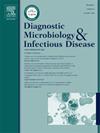Pilot study evaluation of the eQUANT™ system for accelerated antimicrobial susceptibility testing of gram-negative organisms directly from positive blood cultures
IF 2.1
4区 医学
Q3 INFECTIOUS DISEASES
Diagnostic microbiology and infectious disease
Pub Date : 2024-12-24
DOI:10.1016/j.diagmicrobio.2024.116665
引用次数: 0
Abstract
We describe results from a multicenter pilot study evaluating the eQUANTTM system for rapid generation of a standardized inoculum (0.5 McFarland equivalent) directly from blood cultures positive for target gram-negative bloodstream pathogens for same-day antimicrobial susceptibility testing (AST) by disk diffusion, MicroScan and Vitek2 methods. Out of 167 blood cultures that met study criteria (monomicrobial with one of 9 target gram-negative species), colony counts from eQUANT suspensions of 164 (98.2 %) were within the acceptable range of 1-2e8 ± 0.6 log10 CFU/mL (2.51×107 to 7.96×108 CFU/mL). Average eQUANT testing time was 72 min and AST results were available an average of 22.3 h earlier compared to next day testing. Overall performance of direct versus next day AST was excellent, with categorical agreement of 97.5 %, 96.9 % and 96.7 %, respectively, by disk diffusion, MicroScan and Vitek methods. For clinical application this could facilitate antibiotic stewardship and provide targeted antibiotic therapy recommendations earlier.
eQUANT™系统用于直接从阳性血液培养中加速革兰氏阴性菌的抗菌药敏试验的初步研究评估。
我们描述了一项多中心试点研究的结果,该研究评估了eQUANTTM系统,该系统可直接从靶革兰氏阴性血流病原体阳性的血液培养物中快速生成标准化接种物(0.5麦克法兰当量),并通过圆盘扩散、MicroScan和Vitek2方法进行当日抗菌素敏感性试验(AST)。在167个符合研究标准的血液培养物中(9个目标革兰氏阴性菌之一的单微生物),164个(98.2%)的eQUANT悬液菌落计数在1- 208±0.6 log10 CFU/mL (2.51×107至7.96×108 CFU/mL)的可接受范围内。平均eQUANT测试时间为72分钟,AST结果比第二天的测试时间平均提前22.3小时。直接与次日AST的总体表现非常好,通过磁盘扩散,MicroScan和Vitek方法,分类一致性分别为97.5%,96.9%和96.7%。对于临床应用,这可以促进抗生素的管理,并提供有针对性的抗生素治疗建议。
本文章由计算机程序翻译,如有差异,请以英文原文为准。
求助全文
约1分钟内获得全文
求助全文
来源期刊
CiteScore
5.30
自引率
3.40%
发文量
149
审稿时长
56 days
期刊介绍:
Diagnostic Microbiology and Infectious Disease keeps you informed of the latest developments in clinical microbiology and the diagnosis and treatment of infectious diseases. Packed with rigorously peer-reviewed articles and studies in bacteriology, immunology, immunoserology, infectious diseases, mycology, parasitology, and virology, the journal examines new procedures, unusual cases, controversial issues, and important new literature. Diagnostic Microbiology and Infectious Disease distinguished independent editorial board, consisting of experts from many medical specialties, ensures you extensive and authoritative coverage.

 求助内容:
求助内容: 应助结果提醒方式:
应助结果提醒方式:


